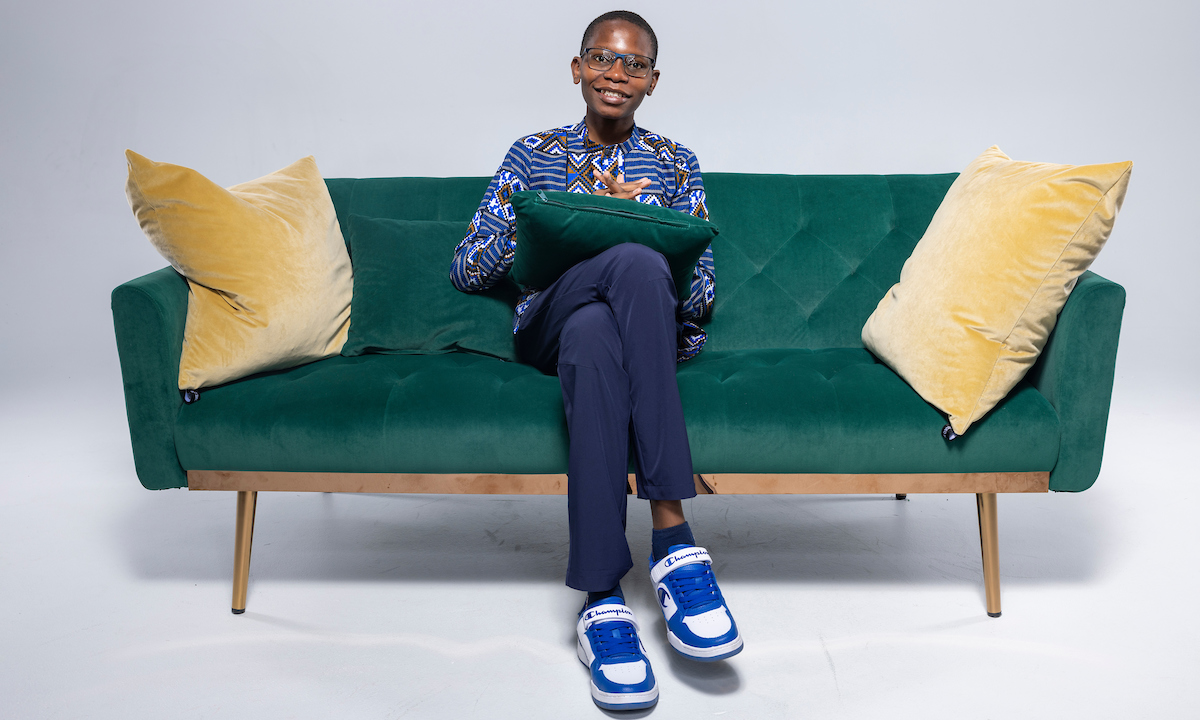As told by Joelle Lieberman
UVU is a place for integration and automation. To build a life.

Photo by
I am currently studying mechatronics engineering technology. Simply put, that’s automation and robotics. It's different fields all combined to be able to automate and build things for fun.
Originally, I was studying industrial electronics in the Democratic Republic of the Congo. My only options were to do polytechnics or just do mechanical engineering. But I was passionate about robotics. I saw mechatronics as a field where you get to build a lot of things. I love being able to build and design things from scratch, automate them, and see them moving in different ways.
I did most of my first projects [in Congo]. The school system back home is that, by ninth grade, you have to pick a major. My capstone was a water-level system with transistors, diodes, and LEDs.

One of my friends who was coming here told me about UVU. I was really opposed to the idea of coming to the U.S. because it is really expensive when it comes to college and education — you know, overall, not affordable. So, I was like, “I'm not going anywhere. I'm not going to the U.S.” I was doing my applications in Canada, in Ukraine, in Turkey. But [my friend] had gone through UVU’s degrees and program websites and saw mechatronics there. He was like, “Hey, you might like that. Just check the website, and you'll see.” So, I went through the full page on mechatronics, and I was like, “This is what I want to do!”
Coming to UVU was super scary. I came here, and I knew how expensive a school was going to be, but I had a little bit of faith. Getting scholarships helped. I was like, “Okay, we're going to make it up.” And my parents were like, “We will make it.” But being here and seeing how everything was — like, how expensive everything was, even just rent, all of it. When you compare the currency from Congo to here, that was a big change. And that was a lot. I came from a big family, and most of the expenses that my parents were spending were coming to me, and I kind of felt bad because of that.
I've gotten more scholarships than I can count since I started my major here. [I got a] scholarship from the engineering technology department. I also got scholarships with different departments that I'm involved with, like the International Student Council, the African Diaspora Initiative, and the First-Generation Student Success Center. I got to give a speech for [the center] as the student guest for the President’s Scholarship Ball. I'm really grateful for all of those [scholarships].
I got a scholarship from Dominion Energy. That was an amazing scholarship. It came with a research opportunity. The research focuses on a bottle filler system where I'm trying to design a system that can fill up bottles by their sizes. I'm super excited.
I got to present [my capstone project]: a part-sorting robot. I worked on it with Isaac and Marion Johnson. We had fun working on it. I remember when we were picking projects, I met with my professor. I was like, “Okay, I'm in a classroom with a lot of resident students, and they all want to do projects just because they can do them. But for me, as an international student, I want to do something that will showcase my skills, because I'm trying to get a job and build up my portfolio.”
So, putting the part-sorting robots together, we used different technology. We had about five programming languages in that system, and we also had parts from different vendors. We put that together and were able to do a system that was able to sort parts using barcodes, and then we used a scanner that we got from Amazon for like $24. That was an industrial grade, but we wanted to showcase that we can use anything just to automate processes and get results.

I love doing hands-on projects. I love sitting in the classroom and learning, but I think I learn just as much when I'm doing things with my hands because when I'm building stuff, I get to remember what I've done. And then, if I mess it up, then I get to remember, “Okay, if I do this, I will mess it up.” Then, if I do another way, if I try different things, they work. I love that — just being able to build something and get results.
I work with all my professors on my projects. Usually, I like to try things out on my own. Then, when I get stuck, I get to reach out to different professors who I know have the credentials and the skills that will help me. I reach out to all of them, and I'll be like, “Hey, let's set up a meeting, like, 30 minutes, if you have 30 minutes to spare on your schedule.” They always had more than 30 minutes. Even though they had other meetings, they would just sit with me, and were like, “Let’s work on this. Let's figure out what's wrong and figure out something that will be helpful for you.”
I know most of my professors have worked in the industry before. So, when I was getting stuck, getting input on things I was doing was helpful. Now, when I go interviewing for jobs, I talk to recruiters about different experiences that I've had. One thing I've noticed while reaching out to other engineers or people is just being able to have open-minded or educated discussions on things that you can do that are helpful in the industry. And they're like, “Wait, you got to do that in college?”
There is always somewhere where you can find information to do what you need to do. And that has been really helpful in becoming the person that I am today. Whenever I look for information, I know where to go find it. If not an associate, somebody else has done it before. If you dig long enough, you will find it.

Two summers ago, I interned with McWane Ductile, a steel pipe manufacturing plant, in Provo, Utah. They took me in as a control engineer intern and trained me on how to do PLC programming and cultivate technical skills that you need when you're working in the plants. It was a great experience. I would spend about 36 hours there, just working and learning different things. That’s actually where I did my first robot programming. After doing my first internship, I loved it.
By the time I was preparing to graduate, I got two job offers, one from Apple. They were all excited to have me on board. Now I'm graduating, and I already have a job.
Automation is taking over. That's not to scare people who are not doing automation, but everything is getting automated. Like, when you go to McDonald's right now, you see things that are automated. We want to make life as simple as possible, and automation kind of does that for everybody. If we look back from 1800 to today, there is a big difference. Nobody uses horses anymore. People use cars now. I don't think we can put a limitation on automation. If we can think it, we can make it happen.

My primary goal [at UVU] was to get an education, and I'm so grateful that I actually get to graduate with a four-year degree, but also got to deviate a little bit. I'm so thankful for that. That was my first step in what I wanted to achieve, but that is not the limit. That is the first step in what I want to build.
The goal is always to go home at some point and implement what I've learned here in the USA. Automation is not implemented back home. And we have the mining industry, which is the sector the economy is based on. [I want to] go home and be the one providing jobs to other people in automation, automating farming, mining, and any other sector I can find out there to make sure that life is better. Right now, Congo is known as one of the richest countries in the world because of its natural resources, but it is still a developing country. I want to change that.
I have a lot of advice for international students. I work as an international student peer mentor with the International Student Council. So, I get to deal with a lot of international students on a weekly basis.

My first piece of advice is never to be afraid of walking into an office and asking the questions that we have as international students. We always have a lot of questions. And sometimes we're like, “Well, I don't know the language.” English is not my first language. It's not even my second language. English is my third, fourth, fifth language. But walking into an office and just saying, “Hey, how are you doing? My name is Jonathan. I'm always walking by this office, and I don't know what you guys are doing. I'm curious. What do you guys do? Can you extend that to me? What kind of opportunities do you have for students? How do you work with international students? Do you have scholarships?”
Scholarships are always a major concern for international students, and sometimes they restrict themselves from applying because they're like, “They don't say anything for international students.” But if you’re a UVU student, you can apply for any scholarship available here on campus. Don't limit yourself to applying for only one scholarship. You can apply for 10, 15, 20 scholarships. Do like I did. Apply for as many scholarships as you can. Sometimes you get a few, sometimes you get you don't get any, but don't give up.
And like I always say, as you're going through college, maybe your first and second year, you can get a job that is not related to a major, but by the time you get in your third and fourth year, get something that is related to a major, even if it's a job on campus. Because that helps you build up the experience you need later after graduation, whether you're staying here or not.
UVU is a place for integration and automation. To build a life.